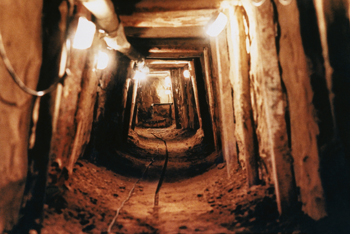![[Metroactive Movies]](/movies/gifs/movies468.gif)
[ Movies Index | Show Times | Silicon Valley | Metroactive Home | Archives ]

The Way Out: Freedom lies at the other end of 'The Tunnel.' Dig They Must Thriller 'Tunnel' runs from East to West A FREQUENTLY compelling, commie-bashing thriller of the old school, Roland Suso Richter's The Tunnel has modest assets. There is a determined hero. There is a big-eyed heroine (Alexandra Maria Lara, quite the babe when she doesn't pull her hair back). And there is an evil Red trying to stop the flow of refugees to the West shortly after the Berlin Wall goes up. The film is based on a true story, and the real-life elements are tense and engrossing, just as the plot points added for the sake of drama seem so false. Harry Melchior (Heino Ferch, a fine Albert Speer in Downfall) is a medal-winning swimmer for East Germany. His best friend, Matthias Hiller (Sabastian Koch), made it to the West through the sewers. Hiller's wife is captured, though, and Hiller vows to bring her to the West. Melchior sneaks through the wall, disguised as a gray-haired Swiss businessman. But his own pleasure in the new freedom is compromised. The swimmer left behind his beloved sister Charlotte, called Lotte (played by Lara). The two decide to organize a group of volunteers to dig a tunnel under the wall into the East. The communist threat may seem about as scary as a stuffed grizzly at the taxidermists. But even when the bear was alive, there were those who looked at it with knowing skepticism. The more realistic '60s spy lore made sure you knew that the West had its cold-blooded, embittering side as well. Read Len Deighton's Funeral in Berlin—a story of the divided city's days as a clandestine information superstore—and the absence of the West German secret service and the CIA in The Tunnel seems like implausible deniability. The undervillaining here is the worst flaw, though. What The Tunnel has is a garden-variety black-bearded fanatic officer called Kruger (Uwe Kockisch). He's patently fictional, and I missed an amoral chess master like John le Carre's Karla or a patriotic scoundrel like Deighton's Col. Stok. One sharp scene brings out the uneasiness of espionage when Melchior has to tell lies to an old lady. Johannes W. Betz's script captures Melchior's unease and also notes that the old lady still says, "Real coffee," with a sigh over a cup of it, decades after wartime ersatz coffee went extinct. Richter thriftily re-creates a long-gone Berlin through nightclub scenes and use of early rock & roll, and he makes a point of the straw-covered bottles of cheap Italian wine all the East Germans drink. Also effective is the scene of the death of an escapee, which finishes with a crane shot of a woman trying to console the dying man through the bricks and the barbed wire. This sort of thing has been wringing audiences since Shakespeare—"That vile wall which did these lovers sunder." When Richter tries for more avant-garde hand-held camera, he can be a little less functional. We see the big escape through the lens of an NBC camera, which breaks up the escapees into undifferentiated flashes of white faces and hands. Even in the 1960s, TV crews used to know where to put the camera. As it wanders past its second hour, The Tunnel shows serious signs of evolving into a miniseries before your eyes. At worst, I started to wonder if anyone was digging a tunnel into a different theater.
The Tunnel (Unrated, 157 min.), directed by Roland Suso Richter, written by Johannes W. Betz, photographed by Martin Langer and starring Heino Ferch, Sabastian Koch and Alexandra Maria Lara, opens Friday at selected theaters.
Send a letter to the editor about this story to letters@metronews.com. [ Silicon Valley | Metroactive Home | Archives ]
|
From the June 15-21, 2005 issue of Metro, Silicon Valley's Weekly Newspaper.
Copyright © Metro Publishing Inc. Metroactive is affiliated with the Boulevards Network.
For more information about the San Jose/Silicon Valley area, visit sanjose.com.